Some people, like Shawn Vecchione, are tired of talking about sharks. The constant chatter about great whites caused Vecchione, who owns Vec Surfboards in Orleans, to close the retail side of his business this summer after 10 years.
“It got to a point where everyone wanted to talk about sharks,” Vecchione said. “Mentally I wasn’t here. My heart wasn’t in the retail side of it.”
Vecchione still handcrafts surfboards at his Orleans shop for customers by appointment. He said about 90 percent of the boards he makes are for off-Cape orders.
Even though Vecchione is tired of the discussion, he knows it isn’t going away anytime soon.
He said he’s gotten advice from shark scientist Greg Skomal about public perceptions of the problem but the frenzy around the sharks became too much for him.
He’s not alone.
Olaf Valli, who owns Sickday Surf Shop in Wellfleet, is tired of the media fever surrounding sharks, too.
“The reality of the danger is not nearly as impactful as the coverage of it,” said Valli.
Unlike Vecchione, Valli chose to keep his shop open, but he saw a sharp drop in wetsuit and surfboard sales this past summer. He said business was down by $20,000 in board sales and rentals in July 2019 compared to July 2018.
Valli understands that being a smart business owner means responding to changing circumstances.
“We’re trying to figure out how we can adapt,” he said. “The rentals were big, and those have really dropped significantly. We’re trying to figure out how to bring in new products that are not surfing related.”
Valli chose to suspend his surf school with lessons at ocean beaches in Wellfleet because of concern that no real preventative measures were being taken for the safety of people in the water.

“It feels like Wellfleet or the state just doesn’t care,” he said. “So once we can show that we do care and there are things in place to keep people safe, then people will be more confident to get in the water again.”
Emma Herrick vacations in Orleans during the summer and taught surf lessons with Cape Cod Surf Camp at Nauset Beach for five years before the town shut down the lessons last summer.
During the previous season in 2018, Herrick said, the surf camp was busy even though there were frequent shark sightings.
“We got pulled out of the water at least twice a week,” she said. “Some people thought it was cool and some people got spooked.”
One family even returned for two more lessons after being called out of the water in their first trip.
If the surf school is reinstated at Nauset Beach, Herrick said, she would be willing to teach lessons there again — but only at low tide.
“I don’t think people should stop swimming, but just be more cognizant of what’s going on and understand the risks,” she said.
Both Herrick and Valli worry about the signs installed by towns and the National Seashore that depict a large image of a great white shark.
“[It’s] valid to put the warnings out but they are grossly misrepresenting the danger that’s there,” Valli said. He believes that rip tides and strong currents are more likely to cause harm.
Both Valli and Vecchione said they had noticed a drop in the number of people surfing. More people are turning to stand-up paddle boarding to get a better view of what’s beneath them.
Coverage Is ‘a Joke’
Matt and Jamie Rivers own the Pump House Surf Shop in Orleans. Matt continued to surf regularly this past summer along with a group of diehard surfers who aren’t going to stop.
Like Vecchione and Valli, the Riverses aren’t pleased with media coverage of sharks.
“It’s a joke,” Matt Rivers said of the national media’s portrayal of sharks on Cape Cod.
When a shark sighting is confirmed at a beach, the standard protocol for lifeguards and beach staff is to get everyone out of the water and close swimming for one hour. If a confirmed sighting is not made again within an hour, then people can get back in the water.
But some local and national media outlets post headlines throughout the summer with misleading information, suggesting an entire beach is closed for an indefinite amount of time. That’s not great for the surf shop business.
“We’re still selling a fair amount of surfboards,” Matt Rivers said. But he knows that shark stories will continue to be a threat to his business.
“This is a big learning year,” Jamie Rivers said. She is also a member of the Eastham Select Board. “The towns are doing what we can.”
The highly anticipated Woods Hole Group shark mitigation study was released last month but didn’t provide definitive recommendations for a single strategy to decrease the risk of shark attacks.
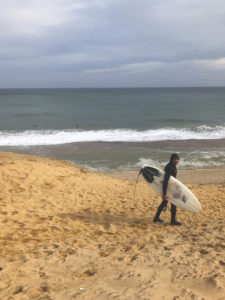
Jamie said the towns ultimately don’t have a lot of control because any major changes would have to go through the state and federal governments.
But whatever the towns do should be done in unison.
“We have to provide a unified approach to the state so that it’s consistent and confident,” she said.
Some companies pitched shark deterrent or detection products at community forums last fall and winter. Sickday and Vec Surfboards did carry products from companies like Shark Shield, Sharkbanz, and RPELA at a reduced cost for locals, but the Pump House chose not to sell those products.
“Our customers come to us because of our product knowledge and I don’t feel comfortable handing [those products] out,” Jamie Rivers said.
She said that they don’t discourage others from selling or using the products but she feels like the products are not fully proven and not a guarantee of safety.
Vecchione and Valli agreed that the products are no guarantee of safety but don’t see them doing any harm.
“Whenever there’s big change, there’s big opportunity,” Matt Rivers said. “There’s potential for growth as long as we’re willing to try and find it.”





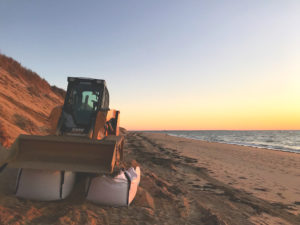
















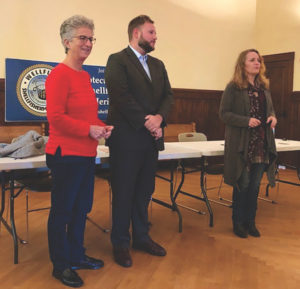

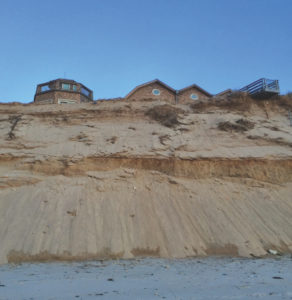
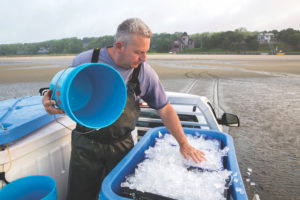

U.S. Attorney Andrew Lelling has questions for towns that have issued host community agreements to marijuana businesses.
Provincetown, Wellfleet, and Eastham town administrators all received subpoenas last month ordering them to produce documents, emails, and any other correspondence associated with the agreements.
They must appear at the John Joseph Moakley U.S. Courthouse to testify before a federal grand jury, according to the subpoena issued on Oct. 8 to Eastham Town Administrator Jacqueline Beebe. The notice commands her to be at the courthouse at 10 a.m. on Nov. 14.
Rae Ann Palmer, town manager in Truro, which has given a host agreement to a cannabis farming group, the High Dune Craft Cooperative, had not received one as of Tuesday, she said. But Wellfleet Town Administrator Dan Hoort and Provincetown Acting Town Manager David Gardner both have, they said.
No one knows why exactly. Katherine Laughman, who represents several towns including Eastham for KP Law, said she could not comment on the subpoenas because federal grand jury investigations are secret.
Lelling’s interest has something to do with the host community agreements, which are the critical first approvals marijuana businesses must get from towns before they can seek state licenses. In the case of medical marijuana dispensaries the agreements are called letters of non–opposition.
The subpoenas call for all written, electronic, or other records relating to any business that has applied for a marijuana (adult use or medical) license.
Officials must include “every iteration and draft version of the agreement,” the orders state. The U.S. attorney wants voicemail recordings and everything pertaining to public deliberations. And he has demanded all records that identify current or former town employees who have been hired by or received payment from a marijuana business applicant.
Gardner said he suspects the subpoenas have to do with the investigation and Sept. 6 arrest of Jasiel F. Correia II, the mayor of Fall River, whom the U.S. Dept. of Justice has charged with “extorting marijuana vendors for hundreds of thousands of dollars in bribes,” according to the U.S. attorney’s public announcement. Lelling’s office, which is prosecuting Correia, states that the bribes range from $100,000 to $250,000 in cash. In exchange Correia agreed to issue non-opposition letters and community host agreements to marijuana business owners, according to Lelling’s office.
Correia, 27, issued at least 14 non-opposition letters for marijuana businesses to operate in Fall River, including two for his current girlfriend’s brother. And when the Fall River City Council passed an ordinance to limit the number of marijuana licenses in the city to 20 percent of the number of off-premises liquor licenses or 11, whichever is greater, Correia vetoed the order, claiming that it would eliminate competition, Lelling’s announcement stated.
Attorney Michael Fee, a Truro resident who represented the High Dune Craft Cooperative in obtaining host community agreements from Truro and Wellfleet, said Gardner is probably correct. The host community agreements have been controversial from the start, he said.
“I can only speculate — I don’t know what Lelling is thinking,” Fee said. “But he’s probably thinking of the abuses unearthed by the Fall River mayor. These are egregious violations of the public trust.”
The host agreements give communities leverage over marijuana businesses. Towns are allowed by law to ask that up to three percent of sales revenue in the first five years be given to the towns as “community impact fees,” said Fee.
There is a clause in the law stating that community impact fees must correlate with the actual cost burden a new marijuana business places on police, fire, and other municipal services.
How do you judge such an impact with a completely new industry? Fee asked.
“My feeling is some cities and towns feel they can interpret this broadly,” Fee said. “So it’s an environment that’s ripe for unscrupulous public officials.”
Towns can also ask for other payments, as well as donations in kind, in the host agreements. These agreements are all public documents.
In Provincetown, for example — which has host agreements with seven pot purveyors — the community impact fee for all vendors is three percent of gross sales. Plus the cannabis vendors must give a discount to low-income medical marijuana card holders and donate 100 hours of community service activities. Each applicant also agreed to make an annual charitable contribution of up to one percent of gross revenues to a fund established to provide grants to social service agencies.
While host community agreements may have some controversial aspects that are open to interpretation, Fee thinks U.S. Attorney Lelling is looking for major corruption, such as what allegedly occurred in Fall River.
It’s highly unlikely Lelling will find anything like that on the Outer Cape, Fee said, adding that the agreements with Truro and Wellfleet on which he advised clients are completely appropriate.
In Provincetown, Gardner said the seven marijuana businesses that have host agreements are still waiting for final state approval. The furthest along, Curaleaf at 170 Commercial St., will probably open in January.
Wellfleet has five host community agreements for retail sales and one for cultivation, though none has final state approval.
Truro has signed only with the High Dune Craft Cooperative.
Eastham has two agreements, one for retail, one for both retail and cultivation.